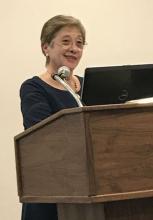Cultural sensitivity key to delivering effective psychiatric care
REPORTING FROM APA
NEW YORK – A mental health clinic started for an urban Hispanic community in Connecticut in 1972 continues to generate lessons on how to apply cultural sensitivity to improve care, according to a critical assessment of the program presented at the annual meeting of the American Psychiatric Association.
“Reviews of the literature show that there is a difference when clinicians are culturally responsive and sensitive to the populations they serve,” reported Esperanza Díaz, MD, of the department of psychiatry at Yale University and medical director, Latino Behavioral Health System (LBHS), both in New Haven, Conn.
“How can I talk about depression treatment to a patient who does not have a place to live?” Dr. Díaz asked. Citing a variety of evidence that links mental health to social issues, Dr. Díaz explained, “We learned to partner with everyone in the community to achieve treatment goals.”
By “everyone,” Dr. Díaz was referring to primary care clinicians, family members, church community groups, social support groups, and even local politicians. She also credited success to peer counselors, which are prior patients trained to provide supportive care. Not least important, family members are recruited to help.
“In the Latino community, family is central to identity,” Dr. Díaz explained. One of treatment goals is to help patients reestablish ties with family and other community members who were lost during a mental health crisis. For this task, peer counselors have proven particularly effective for mitigating stigma and providing guidance.







